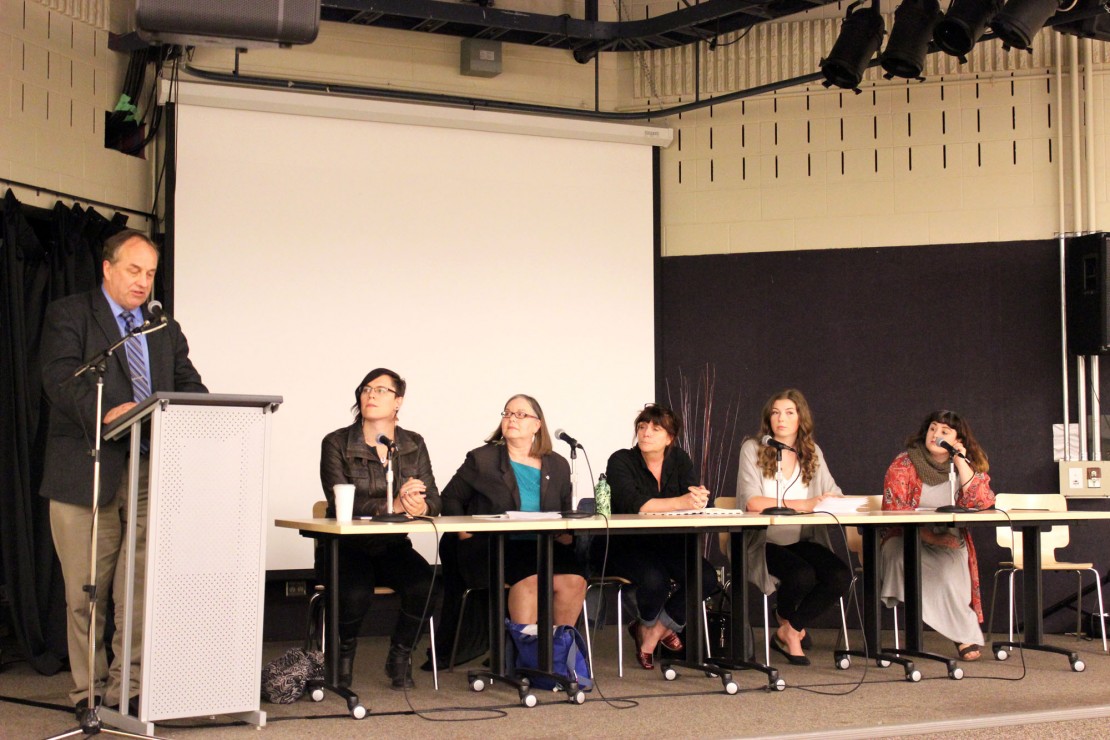
Andrew Weaver (far left) introduces the panelists at the town hall in Vertigo on May 4. (Left to right: Alexa Robin, Karen Wickham, Barbara Allyn, Jean Strong, and Kenya Rogers.) Photo by Myles Sauer
On May 4, Andrew Weaver, MLA for Oak Bay-Gordon Head, hosted a town hall at UVic to discuss Bill 23 and how universities across British Columbia should deal with sexualized and gender-based violence.
It was a rare opportunity for students and the general public to air out concerns and considerations around how to deal with the issue, and those in attendance certainly took advantage.
Hosted in the Student Union Building, the event featured five panellists, each of whom offered their own expertise on the issue: Kenya Rogers, the former UVSS Director of External Relations; Jean Strong, a journalism student from Thompson Rivers University; trauma specialist Barbara Allyn; and Karen Wickham and Alexa Robin, representatives from the Victoria Sexual Assault Centre.
Speaking with the Martlet beforehand, Weaver was excited to hear more about the issue from both the panellists and the audience.
“It’s basically a learning experience [for us],” said Weaver. “It’s appropriate to be on a campus [for this event].”
The town hall comes in the wake of a huge increase in public interest around the topic of sexualized violence at universities, and in society at large, after several high-profile cases lead to the questioning of how institutions handle — and mishandle — the unique crime.
Bill 23, a modified version of legislation first tabled by Weaver on March 8, requires all postsecondary institutions to develop and enact specific policy for sexualized violence that must be reviewed every three years. It has already passed first reading in the B.C. legislature thanks to the support of Premier Christy Clark, and is heading to second reading later this month.
Testimony from the panellists at the town hall was powerful, with all five speaking openly and candidly about their firsthand experiences with sexualized violence and the advocacy work that goes on around it.
Rogers gave a brief overview of the UVSS’ role in that work, making specific mention of the Let’s Get Consensual campaign, and Strong talked about her own experience dealing with a university administration that was unwilling to acknowledge her’s and other survivor’s experiences.
After, Allyn pulled on her background in neuroscience to suggest alternative ways to help survivors through the process of reporting their assaults, and Wickham and Robin discussed the Victoria Sexual Assault Centre’s long and storied role as a resource for the local community.
UVic has already begun to develop its own sexualized violence policy independently of Bill 23, but the panellists stressed the importance of holding the administration accountable and making sure the process respects the view of students and is transparent from beginning to end. Both Weaver and members in the audience acknowledged the lack of UVic administrative personnel in the room.
An audience question period swerved into discussion around sex education reform for K–12 students, but, answering one of the last questions of the evening, Rogers noted how important solidarity amongst the student community is in tackling the issue of sexualized violence on campus.
“The only way to make good policy is by involving all members of the community,” said Rogers.
“The universities are home, sometimes the first home of many, many thousands of young adults across the country,” said Weaver. “And when issues arise, the university, as the tenant and the landlord, I would argue has a responsibility to ensure that there is a safe place for these students and that any issues that are raised are dealt appropriately.”
“[This issue] should simply not be tolerated.”
If you have comments or concerns about Bill 23, email Andrew Weaver’s office at andrew.weaver.mla@leg.bc.ca.






